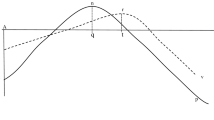Abstract
The purpose of this study is to analyse the implications of Sen's impossibility result, the liberal paradox, for orthodox welfare economics. Because the rather special format of social choice theory makes it a little difficult to be sure of the relevance of this result, the whole dilemma is posed here in terms of a rather informal analysis of information al patterns.
On the one hand, it is argued that the traditional approach to welfare economics, including both utilitarianism and Paretian ordinalism, contains severe informational constraints eliminating the use of all kinds of independent non-utility information in the social evaluation process. This property, called welfarism, is also present in the weak Pareto principle, which conflicts with even minimal requirements of personal liberty according to Sen's result.
On the other hand, it is argued that there is in fact little to be “resolved” in this problem in spite of several attempts to circumvent the conflict. These studies are argued to be mainly ad hoc solutions to the formal problem and relevant only to the extent they indicate how severe restrictions are needed to avoid the paradox. The analogy with the prisoner's dilemma does not work either. Since liberal values are intrinsically non-welfaristic, the liberal paradox can be interpreted as only one, but a rather powerful, example of the informational deficiency of the orthodox approach.
Finally, it is argued that the liberal paradox has striking implications for both the concept of preference and social optimum as well as empirical research on social welfare. This means that if the impossibility is to be taken seriously we need to revalue both the status of utility information and the role of the Pareto principle in social welfare analysis.
Similar content being viewed by others
References
Arrow, K. J.: 1963, Social Choice and Individual Values, 2nd edition, New York.
Batra, R. N. and Pattanaik, P. K.: 1972, ‘On Some Suggestion for Having Non-Binary Social Choice Functions’, Theory and Decision 3, pp. 1–11.
Breyer, F. H.: 1977, ‘The Liberal Paradox, Decisiveness over Issues and Domain Restrictions’, Zeitschrift für Nationalökonomie 37, pp. 45–60.
Breyer, F. H. and Gardner, R.: 1980, ‘Liberal Paradox, Game Equilibrium and Gibbard Optimum’, Public Choice 35, pp. 469–481.
d'Aspremont, C. and Gevers, L.: 1977, ‘Equity and Information Basis of Collective Choice’, Review of Economic Studies 46, pp. 199–210.
Dworkin, R.: 1978, Taking Rights Seriously, London.
Dworkin, R.: 1981, ‘Equality of Resources’, Philosophy and Public Affairs 10.
Gibbard, A.: 1974, ‘A Pareto-Consistent Libertarian Claim’, Journal of Economic Theory 7, pp. 338–410.
Mirrlees, J. A.: 1982, ‘The Economic Uses of Utilitarianism’, in Sen, A. and Williams, B. (eds.), Utilitarianism and Beyond, Cambridge.
Nozick, R.: 1974, Anarchy, State and Utopia, Oxford.
Perelli-Minetti, C. R.: 1977, ‘Nozick on Sen: A Misunderstanding’, Theory and Decision 8, pp. 387–393.
Sen, A. K.: 1970a, Collective Choice and Social Welfare, San Francisco.
Sen, A. K.: 1970b, ‘The Impossibility of Paretian Liberial’, Journal of Political Economy, pp. 152–157.
Sen, A. K.: 1973, On Economic Inequality, Oxford.
Sen, A. K.: 1976, ‘Liberty, Unanimaty and Rights’, Economica 43, pp. 217–245.
Sen, A. K.: 1977, ‘On Weights and Measures: Informational Constrains in Social Welfare Analysis’, Econometrica 45, pp. 1539–1572.
Sen, A. K.: 1979a, ‘Personal Utilities and Public Judgements or What's Wrong with Welfare Economics’, Economic Journal 89, pp. 537–558.
Sen, A. K.: 1979b, ‘Utilitarianism and Welfarism’, Journal of Philosophy 9, pp. 463–489.
Sen, A. K.: 1979c, ‘Rational Fools: A Critique of the Behavioural Foundations of Economic Theory’, in F. Hahn and M. Hollis (eds.), Philosophy and Economic Theory, New York.
Sen, A. K.: 1980, Equality of What?, in S. McMurrin (ed.): Tanner Lectures on Human Values, Cambridge University Press, Cambridge.
Sen, A. K.: 1981a, ‘A Reply to “Welfarism: A Defence Against Sen's Attack” ’, Economic Journal 91, pp. 531–535.
Sen, A. K.: 1981b, Poverty and Famines; An Essay on Entitlement and Deprivation, Oxford.
Sen, A. K.: 1983, Liberty and Social Choice, Journal of Philosophy 1, pp. 5–28.
Sen, A. K.: 1984, ‘Rights and Capabilities’, in A. K. Sen (ed.), Resources, Values, and Development, Basil Blackwell, Oxford.
Author information
Authors and Affiliations
Additional information
The author is grateful to Professor Amartya Sen and Matti Tuomala for helpful comments and suggestions.
Rights and permissions
About this article
Cite this article
Allén, T. The impossibility of the Paretian liberal and its relevance to welfare economics. Theor Decis 24, 57–76 (1988). https://doi.org/10.1007/BF00137223
Issue Date:
DOI: https://doi.org/10.1007/BF00137223




